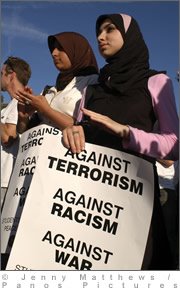
OUR FEELINGS ABOUT SOME OF THE ANTI-TERRORISM MEASURES
As citizens of the United Kingdom, our group of Brighton & Hove Muslim Women alongside other peace and justice loving people of Britain, feel the need to communicate our view regarding some of the new anti-terrorism measures in the aftermath of the appalling London bombings of 7/7/2005. The British Muslim community as a whole has always been a law-abiding community. and all its endeavours to create a more just society have been entirely peaceful. We fear that recent events are being exploited by some sections in society to demonise legitimate Islamic and much fought for British values and beliefs, and subsequently lay the foundations of what could become an authoritarian police state.
If your history lessons have never captured your imagination we hope that the list below will refresh your memory. Those of you, reading this post and thinking that a drift towards authoritarianism is an exaggeration, we kindly ask you, to look again at today's measures and their similarity with methods used by well known, past and present totalitarian regimes.
· "Pointing the finger at minority groups";
· "Patrolling police with heavy machine guns";
· "Deporting people to well-known oppressive countries and making agreements with their leaders";
· "Punish and /or silence those exposing the truth about political & intelligence blunders";
· "A compulsory ID card with no data protection at the price of fundamental civil liberties and a cost of £300+/person of taxpayers' money".
In the light of the above many British people including ourselves, thought it proper to make the following observations:
1. The term “extremism”, frequently used in the public discourse about religion and terrorism, has no tangible legal meaning or definition and is thus unhelpful and emotive. To equate ‘extremism’ with the aspirations of Muslims for Shariah laws in the Muslim world or the desire to see unification towards a Caliphate in the Muslim lands, as seemed to be misrepresented by the Prime Minister, is inaccurate and disingenuous. It indicates ignorance of what the Shariah is and what a Caliphate is and will alienate and victimise the Muslim community unnecessarily.
2. The Muslim community in Britain has unequivocally denounced acts of terrorism. However, the right of people anywhere in the world to resist invasion and occupation is legitimate. Therefore the proposal to criminalise ‘justification’ or ‘validation’ of such self-defence appears to be intended to stifle discussion about, and support for, such resistance. Thus anyone even verbally opposing the illegal invasion of Iraq, for example, could in future be made out to be justifying and supporting ‘acts of terrorism’ and prosecuted. We are concerned that these proposed measures are intended to prevent the popular opposition witnessed in the run-up to the Iraq war should the United States wish to attack Iran, Syria or any other sovereign nation in the near future.
3. It is natural for Muslims to feel sympathy with fellow Muslims elsewhere in the world and to desire justice for those of them living under oppression. Many people compare the Israeli reality with South African apartheid and demand a similar solution. To denounce anybody who questions the legitimacy of Israel will be seen as an attempt to silence academic thought and legitimate political expression. If the government hopes to pander to Zionist pressure by condemning and excluding from this country people who are critical of Israeli apartheid, it is in fact supporting apartheid.
4. The proposal to ban the non-violent organisation Hizb ut-Tahrir is, in our view, unwarranted, unjust and unwise, and runs counter to all the principles which Western democracies are currently trying to promote abroad. Any disagreement with a political organisation must be expressed through debate not censorship. Whatever objections one may have to someone else’s point of view, we must uphold their right to hold and articulate those views. If it is suggested that any laws have been broken by any individuals or groups then this must be proven by due legal process. Criminalising the mere possession of certain opinions is the hallmark of dictatorships, not democracies. Who will be next?...
5. The same reasoning applies to the proposal to close mosques if they are arbitrarily defined as being ‘extremist’ or to try and politically influence what may or may not be said during a religious talk. This would amount to a collective punishment of the community and will be likely to create fear and prevent legitimate political discussion within mosques. This repression could lead to the very radical sub-culture which we all seek to prevent. Not only that, deciding that abhorrent statements by some are less abhorrent than others', when both could equally contribute to the justification of acts of terror - consider here violence-fueling statements by the BNP whose orators still enjoy freedom of speech as opposed to the singling & punishment reserved to certain Muslim orators only - is also a sign of discrimination.
6. The proposal to deport and/or extradite foreign nationals to countries known for gross human rights abuses is abhorrent to a civilized nation, irrelevant of whether or not a diplomatic assurance that deportees will not be mistreated is obtained. This recent move comes across as a cynical attempt to resolve the problem of dealing with those currently under “control orders” after the judiciary found their continued detention without trial to be unlawful. Given that the alleged bombers on 7 July in London were British nationals, such an exploitation of the events to move against foreign nationals as well as unwanted asylum seekers is indeed shameful.
This list of concerns is not conclusive, but we are putting these issues forward to help prevent a knee-jerk reaction to recent events, which would drive a rift between communities in the UK and set the course of British politics onto the slippery slope of intellectual censorship and totalitarianism.
Comments